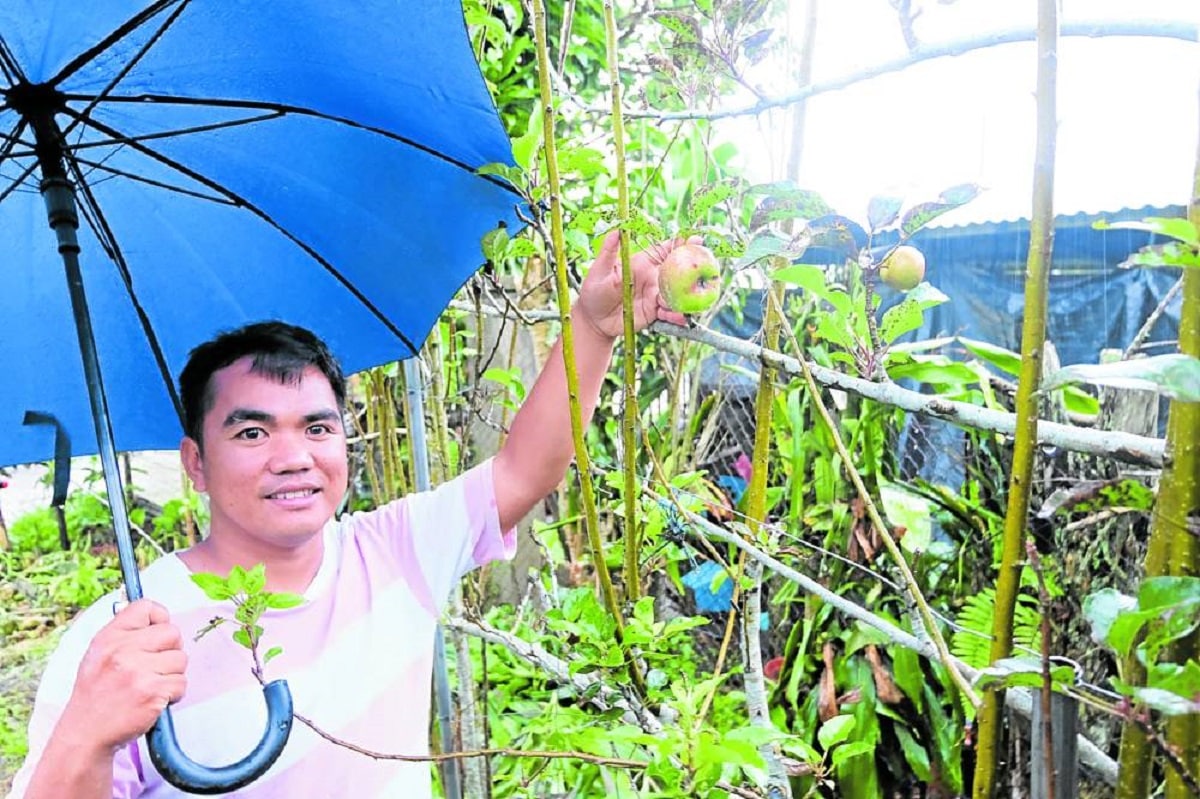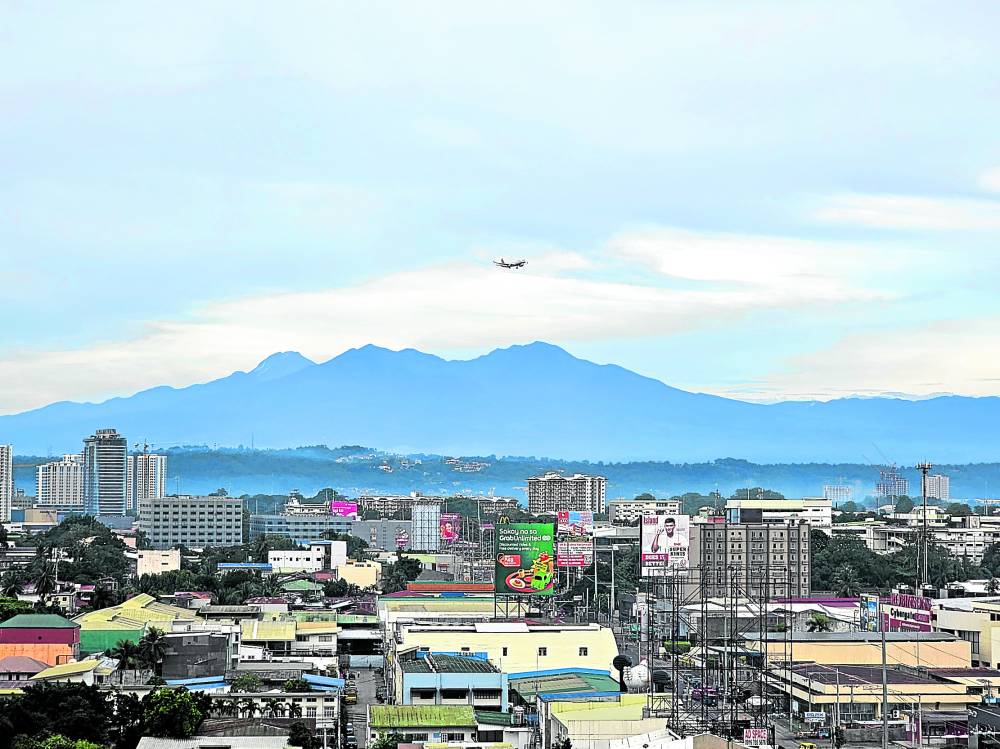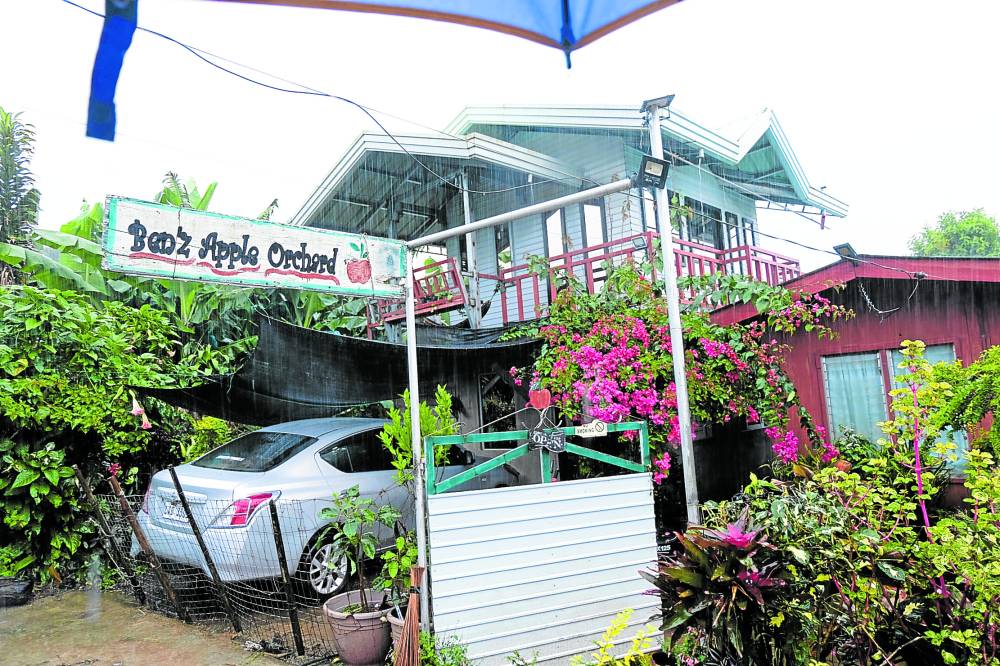Apple-growing venture sprouts in Apo’s foothills

FROM ONE TO 500 From one seed that sprouted in 2013 and survived to bear fruit, Benzone Sepe’s apple-growing venture now involves at least 500 trees in the foothills of Mt. Apo, shown here looming large over Davao City, earning for him a little fortune. —Photos by Bong Sarmiento
DIGOS CITY, DAVAO DEL SUR, Philippines — Apples, which do not normally thrive in the tropical region, are growing at the foothills of Mt. Apo, thanks to the persistence of an entrepreneur who used to abhor farming.
“When I was growing up, I really hated farming because I saw how my family was barely getting by from my parents’ income from cultivating vegetables. We had a difficult life,” recalled Benzone Kennedy Sepe, 32, the second of three siblings.
But in 2013, his curiosity was tickled about whether the fruit that traditionally grows in the temperate region can be cultivated in their highland community at Sitio Marawer in Barangay Kapatagan here amid its cool environment as it is located in the embrace of the country’s highest peak.
From an imported apple that he bought at the local market, Sepe sowed three seeds at the back of their house. Neighbors and other longtime farmers in the touristy village poked fun at his experiment, telling him to use the rest of his family’s 500-square-meter property to more productive pursuits, instead.
According to Sepe, he just shrugged off the insults and discouragements. His initial success was when one of three sown seeds sprouted and blossomed into a tree.
Article continues after this advertisementSepe and his family treated this apple tree, which they fondly named “Benzone,” as “our goose that laid the golden eggs,” lavishing it with extra care.
Article continues after this advertisementLearning in Korea
While waiting for this lone surviving plant to bear fruit, Sepe was chosen for a religious exchange among members of the Foursquare Church, an international evangelical Pentecostal Christian denomination. This brought him to South Korea in 2015.
There, he saw how apples are grown in abundance, fueling his eagerness to propagate the crop in their village in Kapatagan.
“I need to replicate these apple orchards back home,” he recalled telling himself back then.
Three years after he returned from South Korea and five years after he planted the seeds, Sepe made his first harvest in 2018, earning the distinction of being the first successful apple grower in Mindanao, or perhaps, the entire country.

Photo by Ryan Rosauro
This motivated Sepe to do more research on how to propagate in scale the temperate fruit in a tropical setting.
Today, he has grown at least 500 trees in various plots in Kapatagan, accounting for some 3 hectares in all, intercropped with vegetables and other fruit-bearing trees such as durian, mulberry, langka (jackfruit), persimmon and blueberry, among others.
The apple trees are in different stages of cultivation, with many of them already bearing fruits, Sepe added.
Sepe attributed his successful apple farming to the acclimatization of the varieties he propagated, including Fuji apple, to the weather condition in Kapatagan.
In other countries, he said apples survive in temperatures between 7 and 12 degrees Celsius. His apple farms in Kapatagan thrive in a temperature of between 18 and 26ºC, with a recorded low of 16ºC, hence the need for acclimatizing the crop for it to survive and become productive.
Seeing Sepe’s success, there’s a growing number of agriculture entrepreneurs who are investing in apple farming, seeking saplings from his farm given the rare availability of such supply in the country.
Selling saplings
Hence, sales from apple saplings constitute the bulk of Sepe’s income, instead of from harvested fruits. A grafted apple sapling sells for P3,500 each. Buyers come from different parts of Mindanao and other areas in the country—from the Luzon provinces of Nueva Ecija, Abra, Cagayan, Laguna and Bulacan, including Metro Manila.
From his first successful apple tree, he grafts from it those grown from seeds bought from fresh imported apples flooding the local market. Sepe said that a grafted apple plant can bear fruits within three to five years, and can live for a century if properly nourished.
From the single apple seed that sprouted, Sepe was able to build family-owned enterprises like the Kapatagan Apple Orchard, Rare Fruit Farm and Nurseries Diversified Farm.
Recognition
His achievement was recognized in December 2020 when the Agricultural Training Institute of the Department of Agriculture considered his farm as an apple-growing learning site, the first in the country. Also, the Davao del Sur provincial tourism office has included the Kapatagan Apple Orchard as part of the province’s tourism circuit, helping promote Sepe’s farm.
“I was able to graduate from college because of my apple venture,” he said.
With the good fortune that apple farming showered him, with a shiny car parked in the garage of a modest new home, Sepe now pins his hope on agriculture in turning around his village’s economic lot.
“I’m glad I did not succumb to other people’s negativity that were thrown against me [in the past]. But I’ve proven them wrong. Now, I want Kapatagan to be known in apple farming,” he said.
